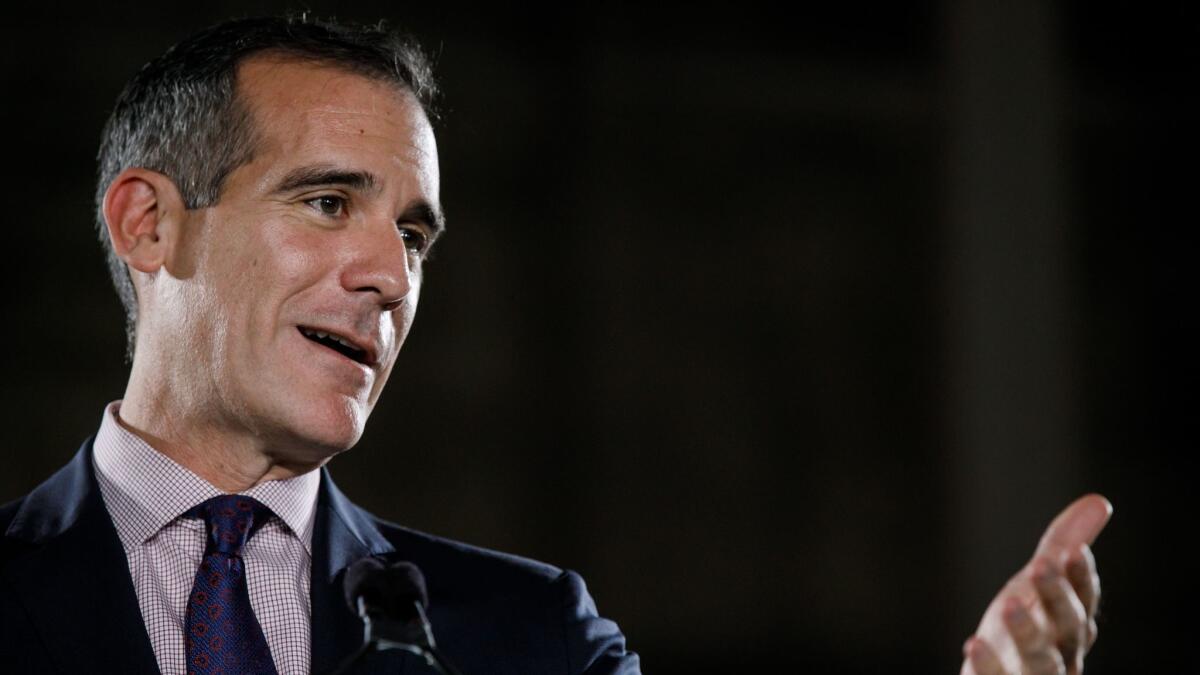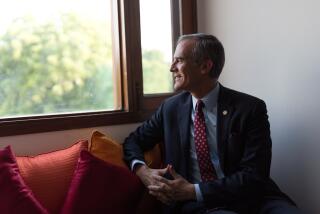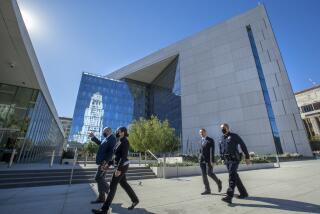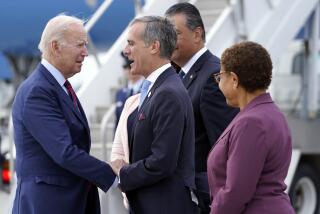On Politics: No one has ever gone straight from City Hall to the White House. Could L.A. Mayor Eric Garcetti end that streak?

There are many paths to the presidency, most of them a standard climb from one elected office to the next.
A whole passel of lawmakers have cycled their way through a governorship or the U.S. Senate en route to the White House. Others arrived with less buttoned-down backgrounds. There have been war heroes, a former haberdasher, a onetime movie actor.
And then, of course, there is the current occupant whose resume — real estate developer, beauty pageant promoter, conspiracy monger, reality TV celebrity — comprises a category all its own.
In the whole history of the United States, however, there has never been a candidate who made the leap straight from City Hall to the White House, or who even managed to win his party’s presidential nomination.
Several mayors have tried, some more plausibly than others. New York’s Rudolph Giuliani — a national hero after 9/11 — was, for a time, the frontrunner for the 2008 Republican nomination until his political ineptitude cratered his candidacy
Irvine’s Larry Agran managed to squeeze into a few photo ops with the rest of the 1992 Democratic field before the race grew serious and he was banished to the ranks of political trivia and a list of otherwise-forgotten rivals vanquished by Arkansas Gov. Bill Clinton.
Now Los Angeles Mayor Eric Garcetti is mentioned as a White House prospect, fresh off his inauguration to a second term. He insists that more than 250 years of unbroken mayoral futility are no deterrent.
“I think all the rules are off,” he told a Wisconsin TV interviewer during a June visit to the Midwestern swing state. “No African American could be president until one was. No reality star could be president until one is.”
True, and true.
First, though, a disclaimer: While Garcetti is making the moves of a White House hopeful — chatting up Democratic donors and national political reporters; showing up at high-brow policy forums; visiting New Hampshire, the first primary state — he remains publicly coy about a run in 2020.
He might even make a relatively late entry into the 2018 California governor’s race.
“He wants to play a role in the national political debate and wants to be active in the debate within the Democratic Party,” said Bill Carrick, a longtime Garcetti political advisor.
In the meantime, “I’m much more focused on today, my responsibilities in L.A. than plotting my political future,” the mayor said in a hey-look-me-over stop this week at the Sacramento Press Club.
Conspicuously, however, he won’t commit to serving out his full term.
There is a case to be made that the job of big-city mayor, with its daily, hands-on demands, offers better training for the White House than, say, being one of 100 members of a U.S. Senate most notable these days for accomplishing close to nothing.
The population of Los Angeles, about 4 million, tops that of nearly half the states, and the city’s $9-billion budget is larger than those of Iowa, Mississippi and Idaho, among others.
Few jobs in politics insinuate an officeholder so immediately into the lives of his or her constituents, whether dealing with local classrooms, potholes or the fallout from a mass shooting or natural disaster. “A mayor has to be both an executive and a micromanager,” said UC Merced’s Jessica Trounstine, an expert on urban politics.
The problem, politically, is the stigma many associate with big cities: Corruption, crime, permissive liberalism and, not least, a sizable minority population that not everyone celebrates as a sign of vibrancy and welcome diversity. That makes it tough for a mayor trying to appeal to rural and suburban voters, who may avoid city life precisely because of its perceived ills.
“Our geographic divisions are overlaid with our political divisions” — the whole red-versus-blue map thing — “in a very clear way,” Trounstine said.
The sentiment, while thoroughly modern, is hardly new.
“I view great cities as pestilential to the morals, the health and the liberties of man,” wrote Thomas Jefferson, who celebrated the yeoman farmer as the American ideal. “The mobs of great cities add just so much to support of pure government as sores do to the strength of the human body.”
Ick.
Another hurdle for any mayor seeking higher office — a governorship, a U.S. Senate seat or, most especially, the White House — is starting with a relatively small base and the need to forge political alliances that may not play well beyond the city limits
“In many cities you need strong union backing. In many instances you need strong backing from the black community, or Latino or immigrant communities,” said Daniel Hopkins, who teaches at the University of Pennsylvania and has written extensively on race and politics at the local level. “Running that gantlet often leaves politicians perceived in certain ways that make it tough for them to appeal on a national stage.”
None of which automatically disqualifies Garcetti should he take a huge leap and try for the White House. President Trump’s improbable election doubtless gives heart to every underdog, long-shot and barrier-breaking candidate, whatever their provenance.
Still, it’s good to have a day job.
@markzbarabak on Twitter
ALSO
Here’s why California’s early 2020 primary is destined to pick the next president. (Nah, not really)
Strange but true: Praise in lefty San Francisco for Pelosi and Trump — gasp — working together
Trump called him ‘my African American.’ But he condemns the president’s treatment of black America
More to Read
Get the L.A. Times Politics newsletter
Deeply reported insights into legislation, politics and policy from Sacramento, Washington and beyond. In your inbox three times per week.
You may occasionally receive promotional content from the Los Angeles Times.











